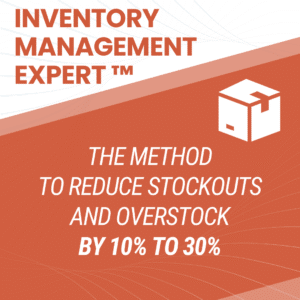Performance at work is the essence of your role in your company. It’s about meeting the requirements of your contract. So how do you boost your performance and make sure that your boss can’t get enough of you?
Before you start, you need to identify your goals as well as those of the company. All too often, the desire to improve is there, but the objectives are not clear.
Remember, these objectives should follow the SMART criteria. They should be :
- Simple
- Measurable
- Attainable
- Realistic
- Time-bound
Once you have defined clear goals, think about how you will be able to measure your performance.
What do supply chain performance indicators look like?
Let’s start with increasing the service level and availability rate. It is always important to look at the issue of customer satisfaction as well as the stock available when the customer orders, and throughout the supply chain. This stock level is often the main cost of doing business, with a major impact on cash flow. Do you have a plan to reduce your inventory? Chances are, it will make you very popular!

If your focus is on logistics, then your first objective is to work on cost reduction. You have to deal with a lot of expenses throughout the supply chain, such as transport, distribution, warehousing, and storage. With better inventory management as your objective, you will ensure a fair balance and allow your company to considerably reduce its costs.
Finally, seek to improve the company’s productivity. Make it your goal to save time. Do you have ideas for shortening the production cycle? Do you know how to automate reporting with macros? Whatever your niche, communicate it to your manager and the company will benefit from your ideas.
To learn more, do not hesitate to read my article 10 KPIs for your Supply Chain.
How to improve your performance at work.
To perform well at work, you need to successfully implement projects. Of course, you have been chosen by the company to meet the requirements of your contract, but implementing projects in addition to your regular tasks will help you stand out.

How? By automating or simplifying a work tool, for example. By implementing new software or algorithm in order to improve the company’s operational processes. Or even by opening up your market to a new country. All of this improves performance and therefore service levels, reducing stock and costs as a consequence.
Are you a manager? Consider putting the emphasis on developing your team. What can you do to improve their performance? Can you train your colleagues in new skills? After all, the more successful your team is, the more your managerial skills will shine! Don’t forget to communicate about your performance. Too often, communication within teams or companies is too negative (stock issues, logistical problems, etc.) Celebrate successes regularly to keep the morale high.

Become an expert in your field.
Becoming indispensable means knowing how to share your strengths and ensuring that your skills become essential to the smooth running of the company. To do this, you need to become an expert (on a subject, a tool). Train yourself and your colleagues. Communicate about your expertise. Travel and network. Make your mark. You’ll become truly indispensable!
However, be careful not to stop yourself from following possible career opportunities. Becoming an expert in your field can lock you into a skill and set up a dangerous routine. When you feel the need, simply find an opportunity to evolve within the company, while training the person who will take over your job.
Be an Intrapreneur.
Becoming an entrepreneur in your own right within your company is a way to get noticed and prove yourself. Coming up with innovative, concrete, and profitable ideas, being autonomous, and thinking about how to improve the company’s performance will make you a true “intrapreneur“. Innovate, initiate, and even create a new service. There are so many opportunities out there. The ultimate goal is to find easy solutions to everyday problems and to make your life and that of your colleagues easier.

After all, there is nothing to stop you from doing projects outside the company. However, be careful not to become competition. Give priority to more personal projects that you are passionate about. Set up a charity, a sporting project; bring something new to the community. Your personal development remains paramount and will make you more attractive to potential employers.
Want to go further?
To develop your skills and take control of your career progression, check out these articles:





